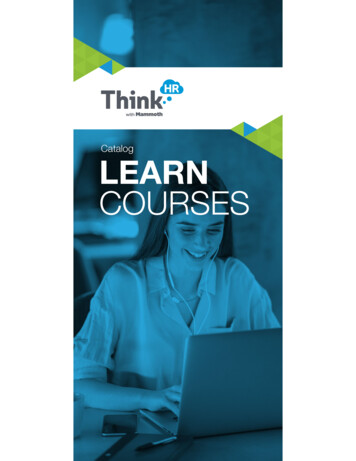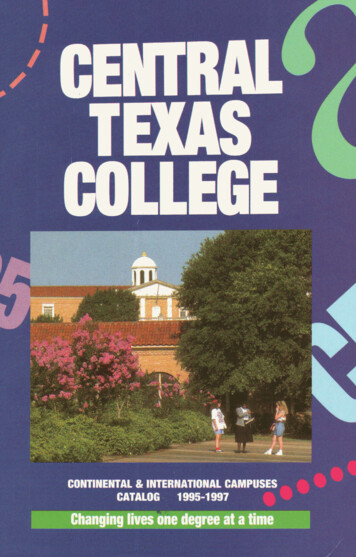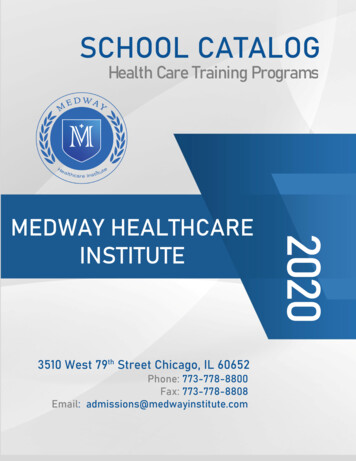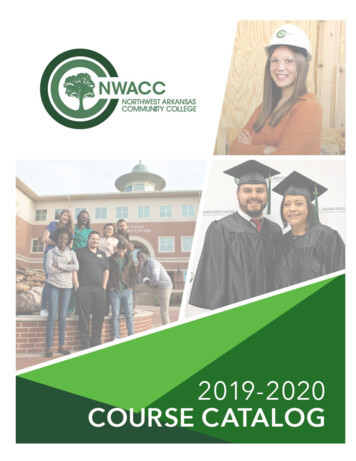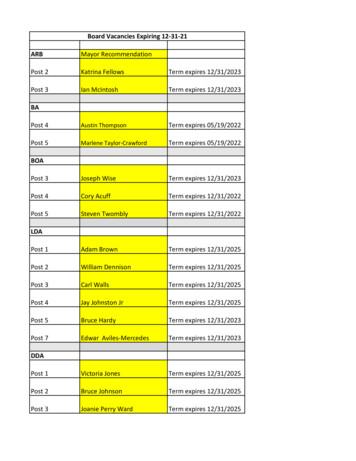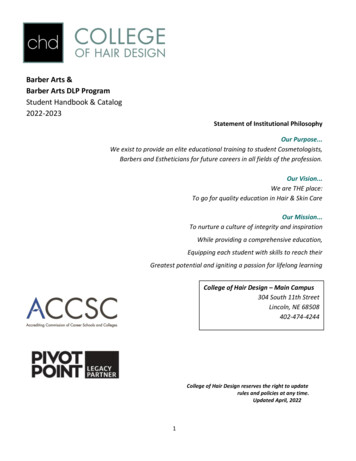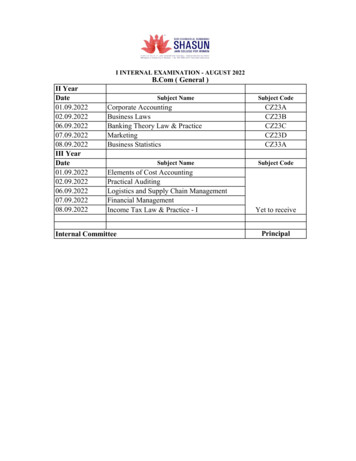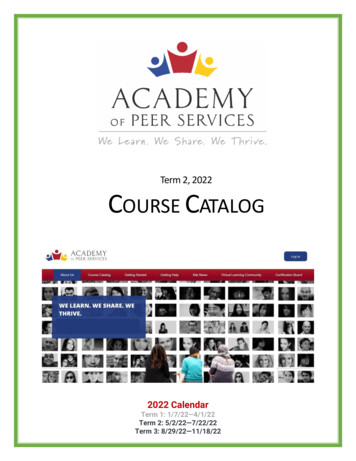
Transcription
Term 2, 2022COURSE ://www.academyofpeerservices.org/2022 CalendarAcademy of Peer Services (APS)Course Catalog, Term 2, 2022Term 1: 1/7/22—4/1/22Term 2: 5/2/22—7/22/22Term 3: 8/29/22—11/18/22Page 1 of 40(Last Updated May 1, 2022)
Table of ContentsABOUT THE ACADEMY OF PEER SERVICES5ABOUT THE CORE COURSES6Action Planning for Prevention and Recovery . 7Creating Person-Centered Service Plans. 7Documentation for Peer Support Services . 7Essential Communication Skills (Active Listening and Reflective Responding) . 7Human and Patient Rights in New York . 8Introduction to Person-Centered Principles (*PR) . 8Olmstead: The Continued Mandate of De-Institutionalization (*PR). 8Peer-Delivered Service Models (*PR) . 8The Goal Is Recovery . 9The Historical Roots of Peer Support Services . 9The Importance of Advocacy . 9The Rehabilitation Act and Americans with Disabilities Act (ADA). 9Trauma-Informed Peer Support. 10ABOUT THE ELECTIVE COURSES10An Overview of Peer Wellness Coaching (*PR) . 11Community Organizing (*PR) . 11Development of Community Assets . 11Ethics and Peer Support: Navigating Complex Relationships . 11Harm Reduction . 12History of the Community Mental Health System . 12Housing Related Peer Support Services . 12Individual Placement and Support (IPS) Model of Supported Employment . 13Insurance Parity . 13Integrated Treatment (*PR) . 13Motivational Interviewing (*PR) . 13Moving Beyond Disability . 14Multicultural Interaction Skills for Peer Supporters . 14Peer Leadership (*PR) . 14Academy of Peer Services (APS)Course Catalog, Term 2, 2022Page 2 of 40(Last Updated May 1, 2022)
Peer Support in Criminal Justice Settings . 14Person-Centered Intake and Assessment . 15Psychiatric Advance Directives (*PR) . 15Self-Care for Peer Providers . 15Social Security Entitlements. 16Stigma and Self-Disclosure. 16Suicide: A Peer-to-Peer Conversation . 16Supervision: An Introduction for Peer Support Providers . 17Supported Employment Specialist Core Competencies (*PR) . 17Supporting Financial Wellness: Moving from Hardship to Hope . 17Supporting Veterans and their Families . 18Transforming Lives With the Arts . 18Whole Family Health and Well-Being . 18ABOUT THE SUPERVISION TRACK18SPS100 - An Introduction to Supervising Peer Specialists: Course 1 . 19SPS101 - An Introduction to Supervising Peer Specialists: Course 2 . 19ABOUT THE APS CE TRACK19About the Peer Model (APM) Series . 20APM00 About the Peer Model: Overview of Peer Services . 20APM01 About the Peer Model: Peer Values and Practices . 20APM02 About the Peer Model: The Power of Peer Support . 20APM03 About the Peer Model: Understanding Peer Services . 21Behavioral Health Equity (BHE) Series. 21BHE01 Behavioral Health Equity: Introduction to Behavioral Health Equity. 21BHE02 Behavioral Health Equity: Practices/Approaches . 21BHE03 Behavioral Health Equity: Strategic Planning . 22BHE04 Behavioral Health Equity: Role Organizational Self-Assessment . 22Grief and Moral Injury (GMI) Series . 22GMI01 Grief and Moral Injury: When Grief Becomes Complicated . 22GMI02 Grief and Moral Injury: Moral Identity & Injury . 23GMI03 Grief and Moral Injury: Alleviating Moral Suffering . 23Academy of Peer Services (APS)Course Catalog Term 2, 2022Return to ContentsPage 3 of 40Last Updated May 1, 2022
Justice Peer Initiative (JPI) Series . 23JPI01 Justice Peer Initiative: A Community Meeting in NYC . 24JPI02 Justice Peer Initiative: Justice Peer Center in NYC Kickoff! . 24JPI03 Justice Peer Initiative: Overview of Criminal Justice System . 24JPI04 Justice Peer Initiative: Updates and Expansion . 25Peer Workforce Integration (PWI) Series . 25PWI00 Peer Workforce Integration: Toolkit Overview . 25PWI01 Peer Workforce Integration: Getting the Conversation Started . 26PWI02 Peer Workforce Integration: Building a Plan . 26PWI03 Peer Workforce Integration: Keeping the Action Active . 26PWI04 Peer Workforce Integration: Evaluating the Implementation . 26Psychiatric Rehabilitation (PsyR) Series . 27PsyR01 Choosing the Life One Wants . 27Racism: A Public Mental Health Crisis (RPM) Series . 27RPM01 Racism: Public Mental Health Crisis . 27RPM02 Racism: Racism In Mental Health in NYC . 27RPM03 Racism: Structural Racism & Children/Families . 28RPM04 Racism: LGBTQIA . 28RPM05 Racism: Becoming an Anti-Racist Organization . 28RPM06 Racism: Leading Anti-Racist Change. 29Supervision Basic Practices (SBP) Series . 29SBP01 National Practice Guidelines for Peer Specialists and Supervisors . 29Supervision During COVID (SDC) Series . 29SDC01 Supervising During COVID: Supervising from Home Part 1 . 29SDC02 Supervising During COVID: Supervising from Home Part 2 . 30Supporting Older Adults (SOA) Series . 30SOA01 Supporting Older Adults: Honoring Their Strengths . 30SOA02 Supporting Older Adults: Life Transitions. 31SOA03 Supporting Older Adults: Our Elders Speak. 31Talking About Tobacco (TAT) Series. 31TAT01 Talking About Tobacco: A New Conversation . 32TAT02 Talking About Tobacco: An Orientation to WRAP . 32Academy of Peer Services (APS)Course Catalog Term 2, 2022Return to ContentsPage 4 of 40Last Updated May 1, 2022
TAT03 Talking About Tobacco: Building Motivation for Change . 33TAT04 Talking About Tobacco: CHOICES and Peer Support . 33TAT05 Talking About Tobacco: Sharing Strategies and Treatments . 34Telehealth Peer Support (ThPS) Series . 34ThPS00 Telehealth Peer Support Series: Overview . 35ThPS01 Telehealth Peer Support Series: Competencies . 35ThPS02 Telehealth Peer Support Series: Outreach and Engagement . 35ThPS03 Telehealth Peer Support Series: Communication . 35ThPS04 Telehealth Peer Support Series: Linking to Services and Supports. 35ThPS05 Telehealth Peer Support Series: Documentation and Technology . 36ThPS06 Telehealth Peer Support Series: Wellness Promotion & Health Literacy . 36Trauma Responsiveness (TRR) Series. 36TRR01 The Trauma of it All: How Race, Oppression, and COVID-19 Intersect . 36DEVELOPMENT TRACK (NON-CREDIT)37The Peer Specialist Certification Process in New York State . 37Making a Success of Online Learning . 37Tips for Facilitating Online Peer Support Groups . 37COMPUTER BASICS (GCF GLOBAL)38CENTER FOR PRACTICE INNOVATIONS38ADDICTION RECOVERY SUPPORT39YOUTH PEER ADVOCATE TRAINING39ABOUT THE APS VIRTUAL LEARNING COMMUNITY39GETTING HELP: APS USER SUPPORT40ABOUT THE ACADEMY OF PEER SERVICESThe Academy of Peer Services (APS) is an online training, testing, and tracking platform forthe peer support workforce in New York State. APS courses are free of charge and open toanyone with an interest in learning about peer support and peer-delivered services.To learn more about The Academy of Peer Services, visit this link.Academy of Peer Services (APS)Course Catalog Term 2, 2022Return to ContentsPage 5 of 40Last Updated May 1, 2022
The course catalog is published at the beginning of each term and updated as new coursesare added or revised. Courses are listed in alphabetical order under their respectivecategories (Core, Elective, CE, Supervision, Developmental). The table of contents hashyperlinks to the course descriptions.ABOUT THE CORE COURSESThe core courses provide foundational knowledge about peer services for mental healthcare in New York State. Successful completion of the 13 core courses is the first step towardpeer specialist certification in New York. Additional requirements must be fulfilled asdefined in the application to become a New York Certified Peer Specialist (NY-CPS).If you are seeking certification as a New York Certified Peer Specialist (NY-CPS), visit theNew York Peer Specialist Certification Board website to learn how to become certified:http://nypeerspecialist.org/If you plan to work with youth, families, those with HIV, or those working on recovery fromaddiction in NYS, separate organizations offer credentialing for peer support workers. Formore: -in-new-york/If you are seeking certification or continuing education, but are not located in New York,check with your state certification authority, professional association, or employer for howthese courses can be counted for certification or professional development.Next you will find an alphabetical listing of the 13 core courses, their seat times (estimatedhours required to complete) and any prerequisites (*PR) that must be completed prior toregistering for and starting a particular course. For example:Before you can take this:You need to pass this:Introduction to Person CenteredPrinciples (*PR)The Goal is RecoveryOlmstead: The Continued Mandate forDeinstitutionalization (*PR)The Rehabilitation Act and Americanswith Disabilities Act (ADA)Peer Delivered Service Models (*PR)The Historical Roots of Peer SupportServicesCourses with (*PR) in the course title have a prerequisite and the name of the course thatmust be taken first is listed in the course description.Academy of Peer Services (APS)Course Catalog Term 2, 2022Return to ContentsPage 6 of 40Last Updated May 1, 2022
The Core CoursesAction Planning for Prevention and RecoverySEAT TIME: 4 HOURS PREREQUISITE: NONEThere are many different types of self-help plans, including relapse prevention, wellness,advance directive, and crisis management plans that are created by people for their ownuse in different stages of recovery. The Wellness Recovery Action Plan (WRAP ) is a popularexample of a self-help plan. This course contains an overview of self-help plans, theelements of a plan, the process of creating a plan, and strategies for working with others oncreating a plan for themselves.Creating Person-Centered Service PlansSEAT TIME: 4 HOURS PREREQUISITE: NONEBuilding on Introduction to Person-Centered Principles, this course covers the elements of aservice plan and roles peer providers can play in helping to incorporate recovery-orientedperson-centered (ROPC) approaches into the service planning process. The course includesexamples from the New York State Personalized Recovery-Oriented Services (PROS)handbook for creating service plans that meet regulatory, quality, and fundingrequirements for a PROS program while using ROPC approaches. Most of the PROSexamples and principles apply equally well in other behavioral health settings that areimplementing recovery-oriented person-centered approaches.Documentation for Peer Support ServicesSEAT TIME: 4 HOURS PREREQUISITE: NONEDocumentation is a universal skill for all types of service delivery. Documenting servicescontributes to service continuity, maintains accountability, and substantiates payments forservices. This course introduces you to common documents used when delivering peerservices. By the end of the course, you will be able to write an effective progress note usinga standardized format and develop an incident report.Essential Communication Skills (Active Listening and Reflective Responding)SEAT TIME: 6 HOURS PREREQUISITE: NONEIn this course, you will learn engagement strategies, i.e., preparing, attending, observing,and listening, and will analyze reflective responding techniques, i.e., response to content,response to feeling, response to meaning, and personalized response. Finally, you will applycommunication skills by evaluating video vignettes for effective communication techniques.Academy of Peer Services (APS)Course Catalog Term 2, 2022Return to ContentsPage 7 of 40Last Updated May 1, 2022
The Core Courses (Continued)Human and Patient Rights in New YorkSEAT TIME: 1 HOUR PREREQUISITE: NONEThis course helps you obtain a basic understanding of human rights protection in New YorkState. The content is designed to assist you in identifying the primary functions of the NewYork State Division of Human Rights. The course provides directions on how to accessdocumentation to file a complaint and explains the rights of persons served in inpatient andoutpatient settings in New York State.Introduction to Person-Centered Principles (*PR)SEAT TIME: 4 HOURS PREREQUISITE: The Goal is RecoveryTraditional mental health care has been system-centered, focusing on what is needed tosustain the organization (funding, staffing, policies, and procedures, etc.). Personcentered principles begin instead by getting to know and deeply understand each person todetermine what is most important to each person as the basis for a collaborative workingrelationship. By the end of the course, you will be able to identify and give examples ofvalues and strategies of person-centered practices.Olmstead: The Continued Mandate of De-Institutionalization (*PR)SEAT TIME: 1 HOUR PREREQUISITE: The Rehabilitation Act and Americanswith Disabilities Act (ADA)This course exposes you to the continuing mandate of deinstitutionalization known as theOlmstead Act. The course discusses the Olmstead vs. Lois Curtis ruling that statedsegregation in institutions constitutes discrimination based on disability. Further, thiscourse describes the “integration mandate” of the Americans with Disabilities Act (ADA)that requires public agencies to provide services in the most integrated setting possibleaccording to the needs of any qualified individual with a disability.Peer-Delivered Service Models (*PR)SEAT TIME: 4 HOURS PREREQUISITE: The Historical Roots of Peer Support ServicesThis course describes peer support and its origins, the difference between peer support andpeer-delivered services, a framework to categorize and organize supports and servicesacross a wide spectrum of behavioral health settings, and the research studies that led tonaming peer support an evidence-based practice. The course includes ways to advocate formore peer support and peer-delivered services in one’s community that embody the spiritand values of authentic peer support.Academy of Peer Services (APS)Course Catalog Term 2, 2022Return to ContentsPage 8 of 40Last Updated May 1, 2022
The Core Courses (Continued)The Goal Is RecoverySEAT TIME: 4 HOURS PREREQUISITE: NONEThe concept of mental health recovery is controversial and has been misunderstood bypeople who provide services, people who receive services, and family members of thosewho receive services. Peer providers are often caught in a crossfire of misunderstandingsbetween these different groups. This course provides a context for the controversy byexamining the evolution of the concept of recovery, exploring how recovery is being used incurrent practice, and offering a glimpse at what the future may hold as the body ofrecovery-oriented knowledge, whole health support, and person-centered practicecontinues to grow.The Historical Roots of Peer Support ServicesSEAT TIME: 4 HOURS PREREQUISITE: NONEThe goal of this course is to provide a multicultural awareness of the history of themovement for social justice and human rights for people with psychiatric histories. Itincludes the early days of the peer-run organizations and interviews with many people ofcolor who made contributions to the development of peer support in New York State.The Importance of AdvocacySEAT TIME: 2 HOURS PREREQUISITE: NONEIn this course, peers talk about why advocacy is important. You will access an abundance ofadvocacy resources and learn how to design, develop, and implement an advocacy plan. Thecourse provides a working knowledge of the principles and types of advocacy and how topromote systemic change with confidence.The Rehabilitation Act and Americans with Disabilities Act (ADA)SEAT TIME: 2 HOURS PREREQUISITE NONEThis course begins with the Rehabilitation Act of 1973, the first major federal legislativeeffort to secure equal access and treatment for people with disabilities. The varioussections of the Act are defined and examples of protections under those sections areprovided. The course then gives a thorough review of the Americans with Disabilities Act(Titles I through V) as well as the ADA Amendments Act. Several resources that help youidentify the implications of these Acts are provided throughout the course.Academy of Peer Services (APS)Course Catalog Term 2, 2022Return to ContentsPage 9 of 40Last Updated May 1, 2022
The Core Courses (Continued)Trauma-Informed Peer SupportSEAT TIME: 5 HOURS PREREQUISITE: NONETrauma-informed peer support can counter the impact of trauma on people in recovery byreducing the effects of unresolved and secondary trauma and supporting healing. In thiscourse, you will identify examples of traumatic events and peer responses, examine theprevalence of trauma and its impact on physical and emotional wellness, analyze principlesof trauma-informed practices and their application in peer services that support recovery,and evaluate cultural considerations and the effect of trauma on how we view our culturalexperiences and the lens in which we view the world.ABOUT THE ELECTIVE COURSESThese courses qualify for continuing education toward renewal (not initial certification) ofthe New York State Certified Peer Specialist NYCPS or NYCPS-P. If you are taking the coursesfor a different type of program or work in a different state, check with your certificationauthority to determine whether these courses qualify for credit in your program and/orstate.The following courses have recommended prerequisites that should be completed prior totaking the next course:Before you can take this:You need to pass this:An Overview of Peer WellnessCoachingIntroduction to Person Centered PrinciplesCommunity OrganizingDevelopment of Community AssetsIntegrated TreatmentHarm ReductionMotivational InterviewingEssential Communication SkillsPeer LeadershipPeer Delivered Service ModelsPsychiatric Advance DirectivesHuman and Patient Rights in New YorkCourses with (*PR) in the course title have a prerequisite and the name of the course thatmust be taken first is listed in the course descriptionAcademy of Peer Services (APS)Course Catalog Term 2, 2022Return to ContentsPage 10 of 40Last Updated May 1, 2022
The Elective CoursesAn Overview of Peer Wellness Coaching (*PR)SEAT TIME: 3 HOURS PREREQUISITE: Introduction to Person-Centered PrinciplesHealth and wellness are important for people who have been diagnosed with mental andsubstance use disorders. Health disparities are prevalent; however, wellness-oriented peerapproaches designed and delivered by people in recovery can help individuals realize theirfull potential while living longer, more satisfying lives. The goal of this course is to examinehealth and wellness in the peer community and review how the peer support WellnessCoaching model can help people improve their quality of life.Community Organizing (*PR)SEAT TIME: 5 HOURS PREREQUISITE: Development of Community AssetsAn experienced community organizer presents common community organizing approaches,strategies, and values used to support social change for people in recovery. You will reviewthe role of the peer specialist as a community organizer, defining community organizing andwhy it is important to people in recovery. You will examine four community organizingapproaches commonly used by organizers in the peer support role: Direct ActionOrganizing, Consciousness Raising, The Highlander School Model, and Civil Disobedience,and will formulate their own community organizing approach to support a mental healthissue, applying strategies learned within a given exercise.Development of Community AssetsSEAT TIME: 7 HOURS PREREQUISITE: NONEYou will develop assets which already exist in the community and utilize them effectively intheir roles as peer specialists. The course explains what community assets are, where theycan be found, and how to gain access to them using the Asset-Based CommunityDevelopment (ABCD) model. After identifying and organizing key assets of the ABCD Model,you will construct a community asset map for your locality using Google Maps.Ethics and Peer Support: Navigating Complex RelationshipsSEAT TIME: 4 HOURS PREREQUISITE: NONEIn this course you will define ethics in the context of peer support values, recognizedifferences in how ethics may be viewed in traditional (medically oriented) services vs. peersupport services, and practice skills for ethical decision-making in a variety of settings. Thecourse contains a series of videos and scenarios for developing decision-making based onpeer support and recovery-oriented values.Academy of Peer Services (APS)Course Catalog Term 2, 2022Return to ContentsPage 11 of 40Last Updated May 1, 2022
The Elective Courses (Continued)Harm ReductionSEAT TIME: 4 HOURS PREREQUISITE: NONEThis course presents harm reduction principles for reducing the negative consequencesassociated with substance use when supporting peers in recovery. It relates the history ofthe movement that became Harm Reduction and its development and reviews theprinciples and key features of harm reduction. You will analyze how and why harmreduction works in different situations when peers exhibit at-risk behaviors and will identifyinterventions in harm reduction consistent with the Stages of Change Model.History of the Community Mental Health SystemSEAT TIME: 5 HOURS PREREQUISITE: NONENote: This is a separate course from The Historical Roots of Peer SupportServices, which is located in the Core Course section.This Elective course focuses on the history of the mental health system.Reformers have worked to improve treatment and conditions for people with mental healthconditions throughout history. Each reformer's vision began with high hopes and goodintentions. Many reformers reached their goals. However, a variety of challenges andbarriers clouded some achievements, with ideas regressing or relapsing over time. Thesteady appearance of new visions and dedication of reformers have built on prior successesand resulted in progress toward a recovery-oriented system. This interactive courseexplores the people, politics, values, and roles responsible for reforming the system fromasylums to permanent home addresses. The course’s focus on reformation supports thecritical role of peer supporters for improving today’s mental health system.Housing Related Peer Support ServicesSEAT TIME: 4 HOURS PREREQUISITE: NONEHousing is a critical element for recovery. This course describes housing programs offeredthrough the NYS Office of Mental Health, Homeless Housing Assistance Program (HAAP) &the De
The Academy of Peer Services (APS) is an online training, testing, and tracking platform for the peer support workforce in New York State. APS courses are free of charge and open to anyone with an interest in learning about peer support and peer-delivered services. To learn more about The Academy of Peer Services, visit this link.
